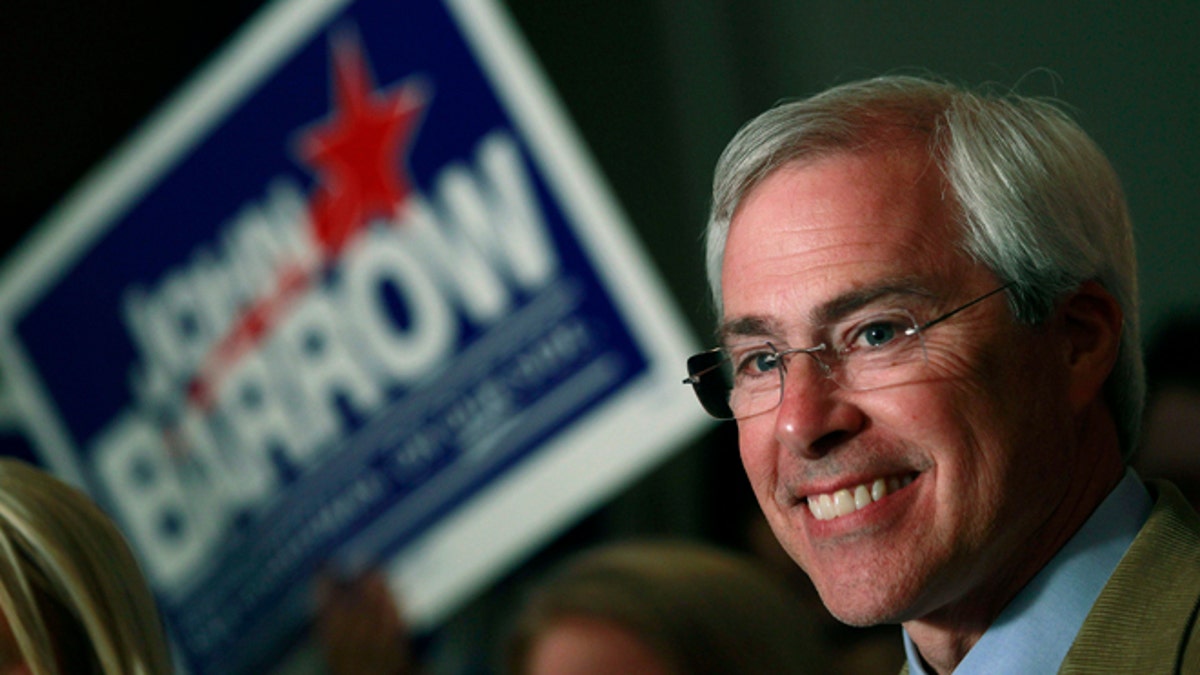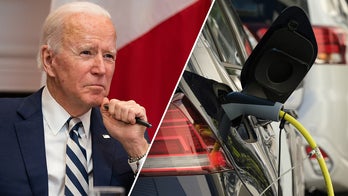
FILE: Nov. 6, 2012: Rep. John Barrow, D-Ga., waits to do a television interview at an election-night party in Augusta, Ga. (AP)
Two top-tier Democratic prospects recently bypassed running for Senate seats in Georgia and South Dakota -- showing that Republicans aren't the only ones with internal jostling and recruiting hiccups ahead of next year's midterm elections.
The prospects’ decisions also show divisions within the Democratic Party and its challenge of finding candidates whose ideologies line up with voters in Republican-leaning states.
Democrats say they'll be fine even though Rep. John Barrow in Georgia and former Rep. Stephanie Herseth-Sandlin in South Dakota declined to seek seats left open by retirements. Both are moderate-to-conservative Democrats whose views would seemingly play well in their states, giving the party a chance to win on GOP turf as Democrats look to hang onto power in the Senate. But without them running, Democrats probably will be forced to back more liberal, less-tested nominees who would likely have tougher races.
The circumstances underscore a particular challenge for Democrats: They have a five-seat cushion requiring that Republicans nearly sweep the most competitive races to gain enough seats for control. But many contests are in states where President Barack Obama never won and remains unpopular. Another hurdle for Democrats: Midterm electorates are generally older, whiter and more Republican than in presidential years.
Georgia Democrats are hoping to recruit Michelle Nunn, daughter of former Sen. Sam Nunn and a nonprofit executive in Atlanta. She's expected to announce a decision soon in the race to succeed retiring Republican Sen. Saxby Chambliss.
In the contest for retiring Democratic Sen. Tim Johnson's South Dakota seat, Democrats' preferred candidate now appears to be Rick Weiland, once a top aide to former Sen. Tom Daschle and twice an unsuccessful candidate for Congress. Weiland launched his bid, with Daschle's backing, amid clamoring about Herseth-Sandlin and Johnson's son, Brendan, a U.S. attorney. State Democrats now say the younger Johnson likely won't run.
"It's a recipe for a challenging campaign," said Steve Dick, a former Daschle aide. "It's a tough race, without a doubt. And it's getting more difficult. We're a red state. We just don't have these opportunities that often."
South Dakota is one of three states where a Democratic senator is retiring in a state Obama lost last November; the others are Montana and West Virginia. There also are Democratic retirements in the swing-voting states of Iowa and Michigan, which Obama won.
Republicans also are aiming at four Democratic incumbents in states Republican Mitt Romney won: Mark Begich of Alaska, Kay Hagan of North Carolina, Mary Landrieu of Louisiana and Mark Pryor of Arkansas. Georgia, which went for Romney by 8 percentage points over Obama, has one of two GOP seats opened by retirements; the other is in Nebraska, a virtual lock for Republicans.
Democrats say they can challenge Minority Leader Mitch McConnell in Kentucky, but they haven't yet recruited a top-tier candidate even though the Republican is unpopular at home.
At the National Republican Senatorial Committee, spokesman Brad Dayspring mocked Democrats for failing at a strategy he says was clear: Get conservative Democrats in Republican-leaning states. But Justin Barasky, spokesman for the Democratic Senatorial Campaign Committee, dismissed the notion of an internal Democratic struggle or recruiting woes, and pointed to divisive primaries shaping up for Republicans in several states.
Clearly, Democrats are left with a tricky balance as they look for candidates with this criteria: Satisfy core Democratic voters, ensure successful fundraising and reach independents who voted for Romney and, before him, John McCain and George W. Bush.
Some Democrats thought Barrow and Herseth-Sandlin satisfied those standards.
Barrow is the Deep South's last white Democrat in the House, and he's beaten well-financed GOP nominees in a House district drawn to ensure his defeat. He's a gun owner who voted against the 2010 health care overhaul and voted to hold Obama's attorney general, Eric Holder, in contempt of Congress. He supported the so-called fiscal cliff deal between Obama and congressional Republicans, and successfully wooed thousands of Romney supporters in his last campaign.
But the way Barrow keeps his job could explain why he abandoned the possibility of a promotion.
"His profile is more appropriate to his congressional district than to a statewide run, particularly for metro Atlanta, where most of the votes are in the progressive base," said state Sen. Vincent Fort, a Democrat from the city.
Some Democrats had feared that Barrow would have drawn a primary opponent, and both national and state Democrats concede that the party's best chance for a Georgia upset is to avoid a divisive primary, while leaving a crowded GOP field to spend money and throw punches.
Fort said Nunn would be a compelling candidate. And Democrats, eager to dispute the notion that losing Barrow is a disappointment, point to polling commissioned by Senate Democrats that suggests Nunn would be the better candidate in a general election.
Former Rep. George "Buddy" Darden said Nunn's lack of experience could be an asset. She doesn't have a record to parse and can run as an outsider, he said, a particular upside if Republicans nominate one of the three sitting congressmen who are running.
GOP Reps. Paul Broun, Phil Gingrey and Jack Kingston are joined by Karen Handel, a former executive with the Susan G. Komen Foundation, the breast cancer organization, in a race that could draw additional, well-financed candidates. Georgia is just one of several states where Republicans face the prospect of divisive primaries.
In South Dakota, Herseth-Sandlin had been seen by national Democrats as a top-tier prospect because her profile fit the state, and they were aggressively courting her behind the scenes. The 42-year-old Sioux Falls lawyer was taking steps toward running, hoping to avoid a divisive primary in which her opposition to the health care bill in 2010 and support for a constitutional amendment banning gay marriage in 2004 would be used against her.
Weiland, meanwhile, quickly entered the race, in part to keep Herseth-Sandlin out, a sign of tension between the moderate and liberal wings. Weiland, who lost to Herseth-Sandlin in the 2004 House primary, is a close Daschle ally.
Brendan Johnson, also a Daschle ally, would not challenge Weiland, especially in a state where successful Democrats are rare and clubby. However, Weiland, while a seasoned party operative, would likely bow out, should the younger Johnson assess the race over the summer and decide to enter in the fall.
That scenario becomes more probable should the race for the Republican nomination become contested, South Dakota Democrats said.
Former Gov. Mike Rounds is running and his fellow Republicans view him as a solid candidate. Yet popular GOP newcomer Kristi Noem, elected to the House in 2010, hasn't ruled out a candidacy. She's popular with the tea party and is seen as a better fundraiser than Rounds.




